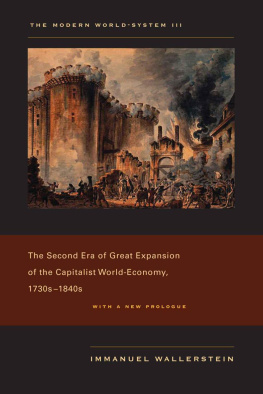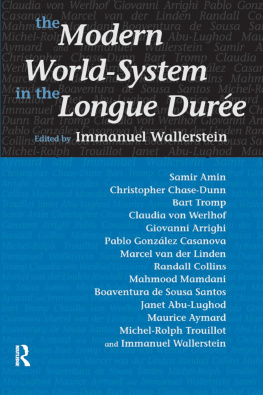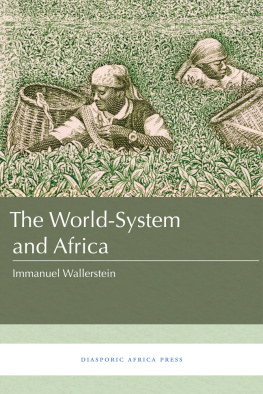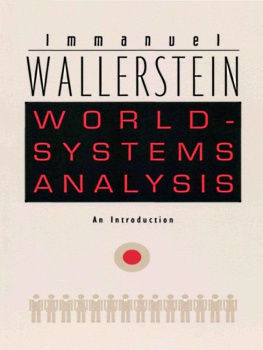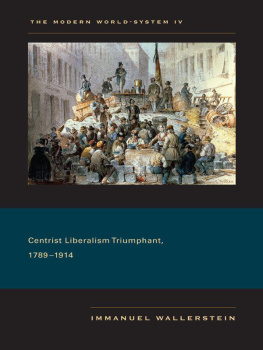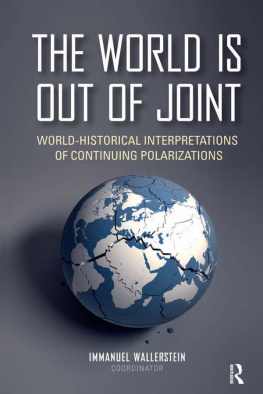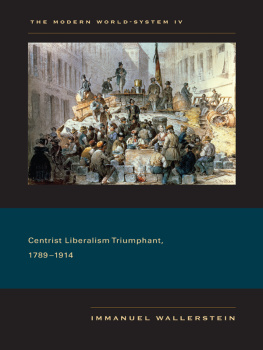THE MODERN WORLD-SYSTEM III
The Second Era of Great Expansion of the
Capitalist World-Economy, 17301840s
Diderots Encyclopedia is considered the quintessential intellectual expression of the Enlightenment and has long symbolized for many the triumph of scientific rationalism as the reigning ideology of the modern world-system. Written by Denis Diderot with the aid of Jean Le Rond dAlembert for the mathematical part, it was published originally from 1751 to 1780, in 35 volumes in folio, of which 21 were text, 12 contained plates, and 2 contained tables constructed by P. Mouchon.
THE
MODERN WORLD
SYSTEM III
The Second Era of Great Expansion of the
Capitalist World-Economy 17301840s
WITH A NEW PROLOGUE
Immanuel Wallerstein

University of California Press, one of the most distinguished university presses in the United States, enriches lives around the world by advancing scholarship in the humanities, social sciences, and natural sciences. Its activities are supported by the UC Press Foundation and by philanthropic contributions from individuals and institutions. For more information, visit www.ucpress.edu .
University of California Press
Berkeley and Los Angeles, California
University of California Press, Ltd.
London, England
Previously published in 1989 by Academic Press, Inc.
2011 by The Regents of the University of California
ISBN 978-0-520-26759-6 (pbk. : alk. paper)
The Library of Congress has catalogued an earlier edition of this book as follows:
Library of Congress Cataloging-in-Publication Data
Wallerstein, Immanuel Maurice, Date.
The second era of great expansion of the capitalist world-economy, 1730s-1840s / Immanuel Wallerstein.
p. cm.
Bibliography: p.
Includes index.
ISBN 0-12-785925-X (hardcover) (alk. paper)
ISBN 0-12-785926-8 (paperback) (alk. paper)
1. Economic history16001750. 2. Economic history17501918. 3. EuropeEconomic conditions18th century. 4. EuropeEconomic conditions19th century 5. CapitalismHistory. I. Title. II. Series. III. Series: Wallerstein, Immanuel Maurice, Date Modern world-system; 3 IV. Series: Studies in social discontinuity.
HC51.W28 1974 vol. 3
[HC52]
330.94'02 sdc19
[330.940253] 88-10457
Manufactured in the United States of America
20 19 18 17 16 15 14 13 12 11
10 9 8 7 6 5 4 3 2 1
This book is printed on 50# Enterprise, a 30% post consumer
waste, recycled, de- inked fiber and processed chlorine free.
It is acid-free, and meets all ANSI/NISO (Z 39.48) requirements.
To Beatrice
CONTENTS
LIST OF ILLUSTRATIONS
The illustrations were selected and annotated with the assistance of Sally Spector.
ACKNOWLEDGMENTS
A number of colleagues have consented to give a critical reading to one or more chapters of this book. Though many of them demur on some major propositions, they each gave me the courtesy of identifying errors or quarreling over emphasis. I thank them each for their valuable assistance and absolve them of all those matters on which I declined their good advice: Perry Anderson, Sabyasachi Bhattacharya, Rondo Cameron, Ferenc Fehr, Walter Goldfrank, Patrice Higonnet, Keith Hitchins, Eric J. Hobsbawm, Terence K. Hopkins, Charles Issawi, Reat Kasaba, Hans-Heinrich Nolte, Patrick K. OBrien, Madhavan K. Palat, Donald Quataert, George Rud, and Charles Tilly.
Part of Chapter 2 appeared in Thesis XI (1986), and an earlier version of Chapter 3 appeared in Studies in History (1988).
PROLOGUE TO THE 2011 EDITION
There are three controversial questions in my treatment of the period running from 1730 to the 1840s. For many analysts, perhaps the majority, this period represents the great turning point of the modern era, the moment when capitalism as a system, or modernity as a mode of existence, came into being. Readers of the first three volumes will know that I do not agree, since I think the great turning point was in the long sixteenth century.
The second controversial question concerns the concept of incorporation into the capitalist world-economy of zones that were previously part of what I have been calling the external arena. This assumes that a distinction can be made between the modern world-system (which is a capitalist world-economy) and other parts of the globe, especially in the period 15001750. It further assumes that there is a significant difference between being a zone outside the capitalist world-economy and being a peripheral zone within the capitalist world-economy.
A third issue is the concept of cyclical processes within the longue dure, and their role in explaining historical processes. These cyclical processes are what are called in French conjonctures (and cognate words in other Romance languages as well as Germanic and Slavic languages; the main exception to this usage is English, in which the word conjuncture is very much not a conjoncture). The principal economic cycle is what is often called Kondratieff long wavesa concept employed in this volume, but one whose very existence is often contested by others.
It is perhaps useful to restate the basic arguments for all three conceptsthe absence of a turning point in this period, the process of incorporation into the modern world-system, and the nature of the Kondratieff long waves. This is particularly important since I believe there has been considerable misunderstanding of what I have been trying to argue.
1. The Great Turning Point
Social scientists of all kinds like to designate turning points. It is a device that clarifies immensely the story they are trying to tell. It becomes a basic building block of their analyses of the immediate phenomena they are studying. The choice of turning points constitutes a basic framework within which we all operate. But choosing different turning points can change entirely the logic of the analyses. What are considered to be the turning points can mislead as readily as they can clarify.
If one reads the major works of the historical social sciences over the past two centuries, one will readily see that a strong favorite in the collective literature for what is the major turning point in the past five hundred (or five thousand) years has been precisely the period 17301840s. Whether one is using the framework of modernity or capitalism or industrialism or Western dominance of the world, most persons have dated its true onset to this periodor at least most persons until the last forty years or so, during which there has come to be a growing questioning of this period as the great turning point. This entire work revolves around a rejection of this period as that turning point in favor of the long sixteenth century as the moment of the creation of the modern world-system as a capitalist world-economy.
In a sense, the entire first three volumes make this case. But allow me to repeat the argument in condensed form. We have argued that the essential element of capitalism as a system is not, as is often contended, proletarian wage labor or production for the market or factory production. For one thing, all of these phenomena have long historical roots and can be found in many different kinds of systems. In my view, the key element that defines a capitalist system is that it is built on the drive for the endless accumulation of capital. This is not merely a cultural value but a structural requirement, meaning that there exist mechanisms within the system to reward in the middle run those who operate according to its logic and to punish (materially) those who insist on operating according to other logics.
Next page
